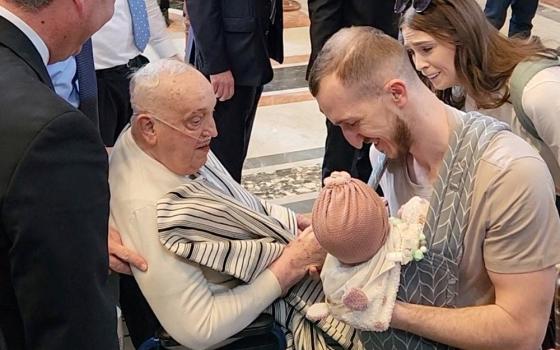The U.S. Conference of Catholic Bishops called for the dismantling of immigration detention Monday, saying the detention facilities "undermine families and harm children." The bishops, working jointly with the Center for Migration Studies, recommended replacing the practice with alternative detention programs that would give back immigrants their dignity and due process. They also voiced their belief that Pope Francis would address the issue when he visits the U.S. in the fall.
Their report, "Unlocking Human Dignity: A Plan to Transform the U.S. Immigrant Detention System," suggested Congress divert funding from detention facilities to immigration courts and community-based programs that would offer supervised release and support for immigrants, except in cases where public safety and security are an issue.
"The psychological and emotional impact of detention, on those seeking protection -- especially mothers and children -- only adds to their trauma," said Bishop Eusebio Elizondo, auxiliary bishop of Seattle and chair of the USCCB Committee on Migration. "The current practice of family detention must end."
Ashley Feasley, USCCB policy adviser for Migration and Refugee Services, said detained mothers voiced "intense concerns about the mental health and well-being of their children" and spoke about their "weight loss, panic and anxiety attacks, interrupted sleep and nightmares, and developmental regression."
Comparing the treatment of detainees to that of criminals, the 44-page report resulted from research by members of the USCCB and the Center for Migration Studies. Researchers visited detention facilities in California, Texas, Illinois, Arizona, Florida and New Jersey. The bishops and Center for Migration Studies leaders outlined the report during a conference call Monday with members of the media.
An executive summary of the report said incarceration has not acted as a deterrent, but has contributed to the misconception that immigrants are criminals. It suggested that alternative programs to detention would be more economical and that Congress should "pass legislation to repeal mandatory detention in all but the most egregious criminal and national security cases."
"The underlying principle here is that nobody in immigrant detention is serving a criminal sentence and they should not be locked up when there are other, more humane and effective and cheaper ways, I might add, to ensure court appearances," said Bishop Nicholas DiMarzio, chairman of the Center for Migration Studies and a member of the USCCB Committee on Migration. "We can ensure public safety without sacrificing our humanitarian principles."
However, U.S. Immigration and Customs Enforcement maintained that family detention centers are one of "many tools used to address the growth in apprehensions of parents and children at our southern border," said Gillian M. Christensen, press secretary for ICE. "They are an effective and humane alternative for maintaining family unity as families go through immigration proceedings or await return to their home countries."
The number of immigrants processed through the detention system yearly has increased from 95,000 in 2001 to 440,000 today, Elizondo said. "This is in part due to the adoption of mandatory detention laws by Congress, the practice of 'no release' policies by the government and a mandatory bed quota of 34,000 persons per day, among other policies," he said. Elizondo was referring to legislation passed by Congress that requires ICE to maintain a minimum of 34,000 beds per day in its detention facilities.
As a result, some immigrants end up with the "criminal alien" label even though most don't have a criminal background, said Donald Kerwin, executive director for the Center for Migration Studies. "Of the persons removed in 2013, about 45 percent were categorized as criminal aliens, but nearly a third of those deported as criminal aliens had been convicted of an immigration related offense, typically illegal entry."
Kerwin said most immigrant detainees are often treated worse than criminals because they are not considered for release by a judge based on community ties or whether they represent a flight risk or danger. "In contrast, virtually all criminal defendants receive custody hearings shortly after their detention and can be released subject to conditions designed to ensure their court appearances, designed to protect the public," he said.
Some of the community-based alternatives suggested in the report were programs offering case supervision services that could be administered outside of lockdown centers.
"They are five times less expensive per day than detention and much more humane," DiMarzio said. "They also ensure that individuals appear at their court proceedings at a rate of over 96 percent."
Part of the problem is that the immigration court system is "severely underfunded," Kerwin said. "It receives between 1 to 2 percent of the funding received by the immigration enforcement system which feeds it. As a result, it faces average backlogs in the courts of around 18 months in the normal removal case."
"ICE is using appropriate prosecutorial discretion and dedicating resources, to the greatest degree possible, to the removal of aliens considered priorities," Christensen said. "ICE makes custody determinations on a case-by-case basis considering all the merits and factors of each case while adhering to current agency priorities, guidelines and legal mandates."
To improve the situation, the bishops and members of the Center for Migration Studies said they intend to ask legislators to provide additional funding for the immigration court system and legal fees for indigent immigrants.
They will also recommend reducing the role of for-profit companies that Kerwin estimated run about 40 percent of detention beds and answer to shareholders. "The report recommends that private corporations should have a more limited role in a far smaller detention system and that they should be more strictly regulated," he said.
Part of the strategy, the bishops said, is to increase efforts to influence Congress about detention matters.
"As we go forward, we will seek to testify and seek to influence our representatives and senators on the issue so that over time, there is an eventual shift away from the mandatory detention situation to alternatives which we think are effective," said Kevin Appleby, director of the USCCB Office of Migration Policy and Public Affairs.
ICE said it remained committed to "sensible, effective immigration enforcement" that includes public safety threats.
"We are constantly assessing our ability to provide care for those in our custody that meets the highest standards, and we welcome the ongoing dialogue with stakeholders to ensure that we are transparent and consistent in our approach," Christensen said.
However, U.S. Rep. Zoe Lofgren, D-Calif., a ranking Democratic member on the House Judiciary Subcommittee on Immigration and Border Security, agreed with the bishops.
"The conclusion that jailing families should stop is one I share," Lofgren said. "I look forward to closely examining these issues in Congress and working towards a more humane approach to immigration enforcement."
Lofgren was one of 32 members of Congress who signed a letter in October asking President Barack Obama to stop the expansion of family detention centers and halt deportations from those facilities. ICE sent a response in January, saying it operates the facilities under the Family Residential Standards: "These standards promote the treatment of residents with dignity and respect, providing standards for correspondence and telephone access, religious practices and a process to address grievances."*
Driving the motivation to change detention policy were the moral issues raised by the bishops and members of the Center for Migration Studies and echoed in the past by the pope. "We are creating a detention industry that flourishes on the backs of human beings who are simply trying to improve their lives or find protection," Elizondo said.
He said he believes Pope Francis will likely bring up the topic during his visit to the U.S.
"I think the Holy Father will certainly address this issue because he has been very much concerned about all the immigrants and especially all these horrendous tragedies that have been happening," Elizondo said, referring to news stories about boats loaded with immigrants capsizing in the Mediterranean Sea.
But he said he also thinks Pope Francis will mention the root causes of mass migration, such as the "economic systems we are running" that force people to live in poverty and force them "to leave their own countries, not because they want to, but because they are in famine."
*An earlier version of this story incorrectly stated that the government did not respond to the letter.
[Nuri Vallbona is a freelance documentary photojournalist and is currently a lecturer at the University of Texas.]




